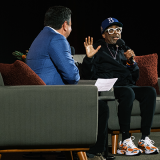Il Cinema Ritrovato Travel Course In Bologna
August 13, 2015
Every summer, our students have the amazing opportunity to visit amazing places as part of our travel courses. For the last few years, Dr. Emily Carman has taken a select group of students to Il Cinema Ritrovato, a fantastic, outdoor film festival in Bologna, Italy.
Some of her students were kind enough to send some of their memories, and photos along, to share with you. We’ll be adding more of their experiences as they come in, but let’s start off with Jessica Johnson (BA/Film Studies ’17):
“This summer, I had the amazing opportunity to take the Il Cinema Ritrovato travel course to Bologna, Italy with Dr. Emily Carman. Myself and thirteen other Dodge College students from a variety of different majors and age ranges took a break from our busy summers to study restored film at the festival. It was incredible to be amongst thousands of eager cinephiles from many different countries.
One of the highlights of the trip for me was seeing Academy Award winning screenwriter and acclaimed director Alexander Payne, known for his films The Descendants (2011) and Nebraska (2013). He and dozens of other industry professionals gave a lecture on the future of film, discussing the pros and cons of shooting a movie digitally versus on film, and new technological advancements that will be available for future generations of filmmakers.
Bologna is also the home to the Cineteca di Bologna, a film restoration facility that has gained so much prominence in the recent years that the archival company is expanding its offices to include a branch in Hong Kong. Our class had the chance to tour the facility, seeing just how much meticulous work goes into restoring a movie.
For anyone who is interested in spending a summer in the gorgeous medieval city of Bologna all while being able to watch classic films under the stars like Sherlock Jr. (performed for us with a live orchestra) and Casablanca (introduced by Isabella Rossellini), I would recommend contacting Dr. Carman at once and discussing a future opportunity to take this course. It was extremely fulfilling and an experience I won’t soon forget!”
- The main plaza, before cinefiles come in
- Filmmaker Jonathan Nossiter talks to students
Next up, we have Caitlin Manocchio, (B.A./Film Studies ’16):
“Attending Il Cinema Ritrovato was a once in a lifetime experience. During the nine-day festival I watched a total of 68 hours of films, including: Goodfellas (1990), Duck Soup (1933), Sherlock Jr. (1924), One Week (1920), Rocco e i suoi fratelli (1960), Jeanne Dielman, 23 quai du Commerce, 1080 Bruxelles (1975), Intermezzo (1936), The Awful Truth (1937), Hana No Naka No Musumetachi (1953), and more with my fellow Chapman film students. I attended amazing seminars on the future of film and even toured the incredible archive lab at the Cineteca di Bologna. As a film studies major it was an awesome experience to meet other Chapman film students in the film studies, film production, and screenwriting programs. As someone who is aspiring to work for international film festivals or in film and television archives in the future, this was the perfect opportunity.
My favorite memory during the festival was watching the 1957 French film Elevator to the Gallows in the Piazza Maggorie when a hailstorm erupted. Our dedicated group of cinephiles stayed through the pouring rain, but when hail started falling from the sky and the metal barriers began to move through the wind we ran for the hotel. Luckily Professor Carman booked a hotel steps away from the Piazza Maggorie. When the hail stopped we returned to the Piazza and learned that they had stopped the projection of the film. It was the first canceled Piazza Maggorie screening in four years.
My favorite film of the festival was the 1966 Senegalese La Noire De (Black Girl) directed and written by Ousmane Sembène. Watching the film was an eye opening experience into the world of the Third Cinema movement, the French colonialism in Senegal, and the issues of cultural identity. Hearing Sembène’s son, Alain, talk about the film’s impact in the realm of African cinema made me appreciate the film’s place in cinematic history even more.
Going to this festival allowed me to see films over a hundred years old that were hand tinted and projected on carbon. Hearing the clicking of the projector, seeing the carbon flame, and having a live orchestra play was a memory I’ll have forever. Experiences like this are why I would persuade Dodge students to talk to Professor Carman in the fall about attending the 2016 Il Cinema Ritrovato. I hope I can attend this incredible festival again.”
And finally, we have Matt Somogyi (BA/Film Production ’17):
I had gone to Europe twice in my life before studying abroad with Professor Emily Carmen in Italy, and it was only to visit my family in Greece. I distinctly remember on both occasions wanting to hop just one country over and visit Italy, to investigate the mythology that surrounds the country, both the ancient and the Renaissance. I was fortunate enough to seize one of the precious spots for the Italian travel course to the annual Il Cinema Ritrovato film festival in Bologna, where I had one of the most invigorating and redeeming cinematic experiences of my life.
I, and my 14 other cinephile comrades, stayed at the Hotel Commercianti which was conveniently located next to the Piazza Maggiore, the central hub of Bologna and the venue for the 1,000-seat outdoor theater. The first film screened at Il Cinema Ritrovato was Scorsese’s Goodfellas at the Piazza Maggiore, and the 1,000 seats were not enough to contain the national cinematic fervor as men, women and children filled the aisles and even the space behind the projector in order to participate in this amazing film going experience. Seeing the theater overflowing with movie lovers was something I will most likely never experience in the U.S. and was a true testament to how film can magically transcend cultures, languages and generations. Other films screened in the Piazza included Casablanca, The Thin Red Line and 2001: A Space Odyssey. However, nothing compared to seeing the film Elevator to the Gallows with my peers in the torrential rain, winds and hail. We were the only viewers remaining in the audience before the audio cut out as the hail started pouring down and we were forced to retreat inside and run for cover.
Professor Carmen kept us busy with tours, lectures and group dinners as we independently mapped out our daily cinema agendas, which usually involved seeing 4-5 films a day. We first did a general architecture tour of the center of the city, including the two famous leaning towers of Bologna (take that, Pisa). Later in the week, we took a tour of the film restoration lab so we can see how film is chemically treated, scanned and ultimately salvaged. Aside from the Piazza Maggiore, there were four other venues to view films at, which included the Cinema Jolly, Cinema Arlechino, Sala Scorsese and Sala Mastroianni. The restored films were exhibited using brilliant 4K projection, while the archived films were projected on their perfectly flawed original prints. Thanks to how the festival was organized, I was able to see back-to-back screenings of Ingrid Bergman’s early films before her Hollywood years, as well as being introduced to one of my now favorite Classic Hollywood directors, Leo McCarey. McCarey’s films served as both comic relief in the case of The Awful Truth, as well as pure devastation with Make Way For Tomorrow; I am proud to say the latter of which made me cry more than any other film I have seen before.
I am already nostalgic for my time spent in Italy. It is otherworldly after you learn so much about a place and then finally get to experience it for yourself. I sincerely enjoyed getting to know students I was only acquainted with before the trip, and excavating some of the lost cinematic classics of world film history with them. All I can say is, if you get the chance to go with Professor Carman to Italy, or on any other study abroad retreat through Dodge, you’ll have one of the most memorable experiences of your life. I can’t advocate it enough.
























